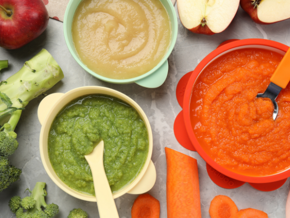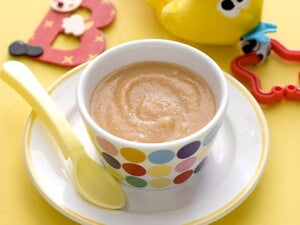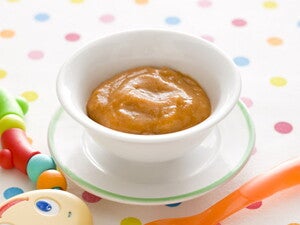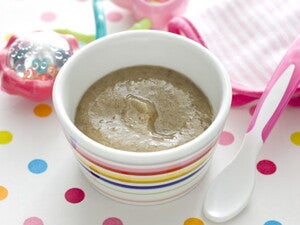
First Foods: When your baby shows signs they are ready for solids.
Consistency: Warm puree
Amount: 1–2 teaspoons working up to about 1/4 cup
Breast feeds: About 5 per day
Timing: Offer sold foods after breastfeeds
Frequency: Starting once a day when baby is happy and settled.
Types of food: Iron-enriched infant cereals, pureed meat, fish, and poultry. Then fruits, vegetables, and dairy can be introduced. Other than introducing iron-rich foods first, the order in which you introduce solids, and the time frame between offering new foods doesn’t really matter. Introducing single foods at first and monitoring for any intolerance or adverse reactions may help.
You can alternate between the five food groups and ensure you’re offering foods with high nutrient density.
There may be disadvantages of starting solids at 4 months if your baby is not developmentally ready. As all babies develop differently, ask your health care professional for tailored advice on when the right time to introduce solid foods is to your baby. Always seek individualised advice when you have a family history of allergy, intolerance, coeliac disease, or your baby is suspected to have feeding delays (such as tongue tie or physical or mental disabilities).
FAQs
How to introduce solids at 4 months
When starting solids at 4 months, begin with single-ingredient pureed foods, like an iron-rich baby cereal or pureed meat as these are great sources of iron. Soft mashed fruits or vegetables are another popular choice. Begin with offering small spoonful’s after a breastfeed or infant formula, and gradually increase the amount. Offer one new food at a time, to monitor for any potential allergic reactions. As every baby develops differently, follow your baby's cues and consult with your healthcare professional for personalised guidance.
How often should a 4 month old eat?
A 4 month old feeding guide will still have breast milk or infant formula providing almost all of what they need nutritionally to grow and develop healthily. When your baby is ready for solid foods, start slowly by introducing iron-rich purees after a breast feed. Start with offering this solid food once a day, and gradually increase this to more meals as your baby grows and requires more food to support their healthy growth. By 12 months of age, your toddler will be consuming mini meals 3-6 times a day, just like the rest of the family.
How much breastmilk should a 4 month old eat?
Breast milk will still be providing most of your baby’s nutrition at 4 months of age. The Australian Infant Feeding Guidelines recommend an infant 3 to 6 months of age will consume on average 150mL/kg/day. As every baby develops and grows differently, it’s important to follow your baby’s hunger and fullness cues. You may find your baby drinks a little more, or a little less than this. Don’t hesitate to talk to your healthcare professional if you are concerned about the amount of breast milk your baby is drinking.
How much solid foods for a 4 month old?
When starting solids at 4 months, offer small spoonful’s after their usual breastfeed or infant formula. You may find at the very start of introducing solid foods, your baby won’t take more than 1-2 teaspoons, however this will increase over time as their grow and develop.
Sources:
Pregnancy, Birth & Baby website. Accessed at https://www.pregnancybirthbaby.org.au/introducing-solid-food
Raising Children parenting website. Accessed at https://raisingchildren.net.au/babies/breastfeeding-bottle-feeding-solids/solids-drinks/introducing-solids






